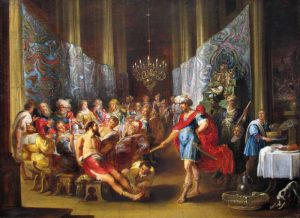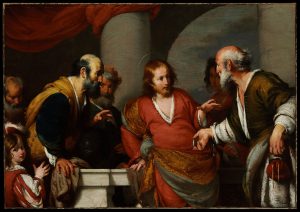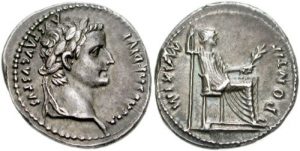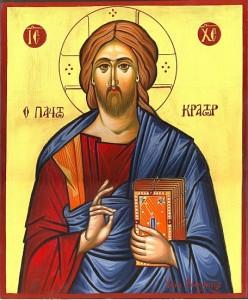Thoughts on Sunday’s Lessons for Oct. 15, 2023
First Reading (Track One): Exodus 32:1-14

The uninvited wedding guest (1631), oil painting on panel by Vincent Malo (c.1602-1644). Muzeul Naţional Brukenthal, Sibiu, Romania. (Click image to enlarge.)
No matter how badly God’s people behave, it seems that our loving Creator manages to find ways to forgive us. In our Track One first readings in this liturgical season, we have followed the descendants of Abraham, Isaac, Jacob and Joseph as they escaped slavery in Egypt, crossed the Red Sea, trekked through the desert, and received the 10 Commandments at Mount Sinai, making a covenant with God. But now things have gone wrong. Fearful of Sinai’s smoke and thunder and afraid that Moses won’t come back from the mountain, they fashion and worship a golden calf. God, outraged, threatens to destroy the people. But Moses pleads for them and God’s abundant love flows in forgiveness to a people who may not deserve it, but who will be forgiven again and again.
First Reading (Track Two): Isaiah 25:6-9
Isaiah prophesies in the context of Israel’s relief from foreign domination after its Assyrian exile. Isaiah exalts and praises a God seen as a warrior who destroyed the enemy while protecting the poor and needy. Then the narrative turns to a beautiful song of hope: In verses that we often hear as a reading in our liturgy for burial, the prophet sings of a banquet that God will prepare: “a feast of rich food, a feast of well-matured wines … of rich food filled with marrow, of well-matured wines strained clear.” This is to be a feast for the people of all nations, united at last in a kingdom where death and tears are no more.
Psalm (Track One): Psalm 106:1-6, 19-23
The Psalmist looks back at the people’s wickedness in worshipping the golden calf, recalling how in this way they threw away the great gift that they had just received. They forgot God, their Savior, who had watched over them in Egypt and brought them safely across the Red Sea and through the desert. They deserved destruction, the Psalmist sings. Yet Moses stood up for them and turned God’s wrath aside.
Psalm (Track Two): Psalm 23
Is there any more beloved song of God’s deep and abundant love than the 23rd Psalm? Our Good Shepherd is always with us, comforting us and protecting us. Our Shepherd is with us not only in the good times when we walk in the green pastures, but all the more in those frightening times when we must walk through the valley of the shadow of death. Just as Isaiah spoke of a banquet table set for the people of God, the Psalmist, too, sees a table of comfort spread out for us in the house of the Lord.
Second Reading: Philippians 4:1-9
Paul shows his pastoral side as he addresses an issue in his flock involving two women leaders in the church at Philippi – Euodia and Syntyche – who have been quarreling. Without taking either side, he urges both of them to “be of the same mind in the Lord.” In beautiful language, he shows how that might look: “Rejoice in the Lord always; again I will say, rejoice.” Be gentle and kind; true, honorable and just, pure, pleasing, commendable and praiseworthy, Paul exhorts this community, and the God of peace will be there.
Gospel: Matthew 22:1-14
We follow last week’s account of the wicked tenants with yet another challenging parable. It’s easy enough for us to grasp the king’s anger at the people who didn’t show up for his son’s lavish wedding banquet, even if destroying the people and burning their city seems more than excessive. But then, after he invited people off the street to take the place of their ungrateful predecessors, this wrathful king angrily ties up and throws out a man who had failed to put on a wedding garment. To put all this in context, remember that we are still in Matthew’s narrative in which Jesus uses a series of striking parables to lecture an angry group of Pharisees. If there is any deeper message, it may be that we are called to follow Jesus fully, wedding garment and all.





